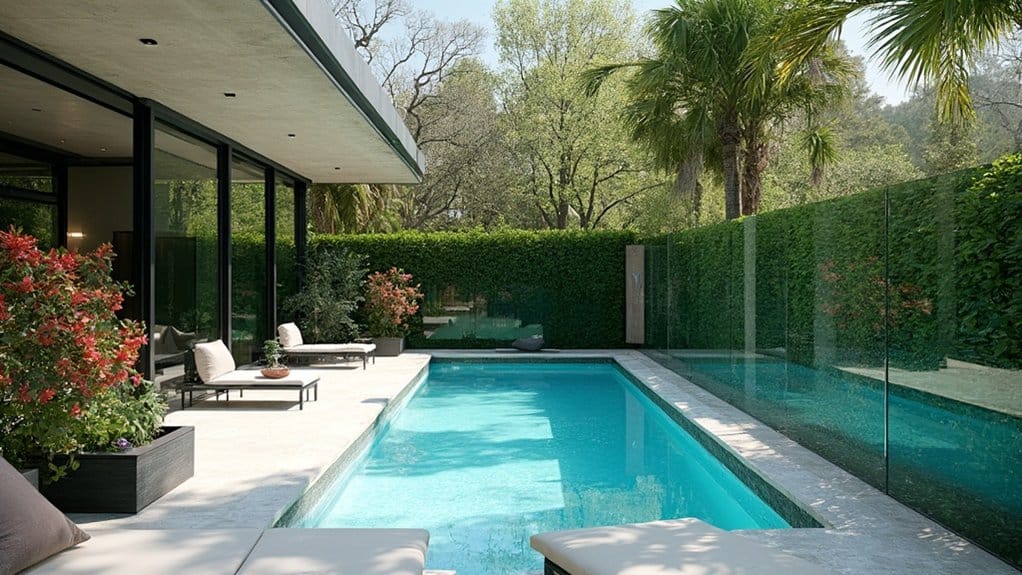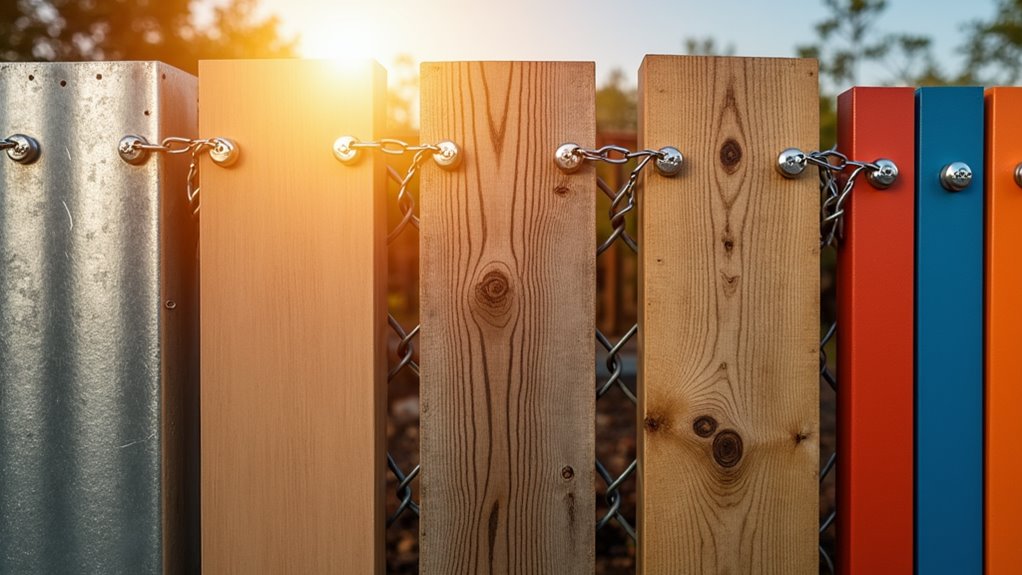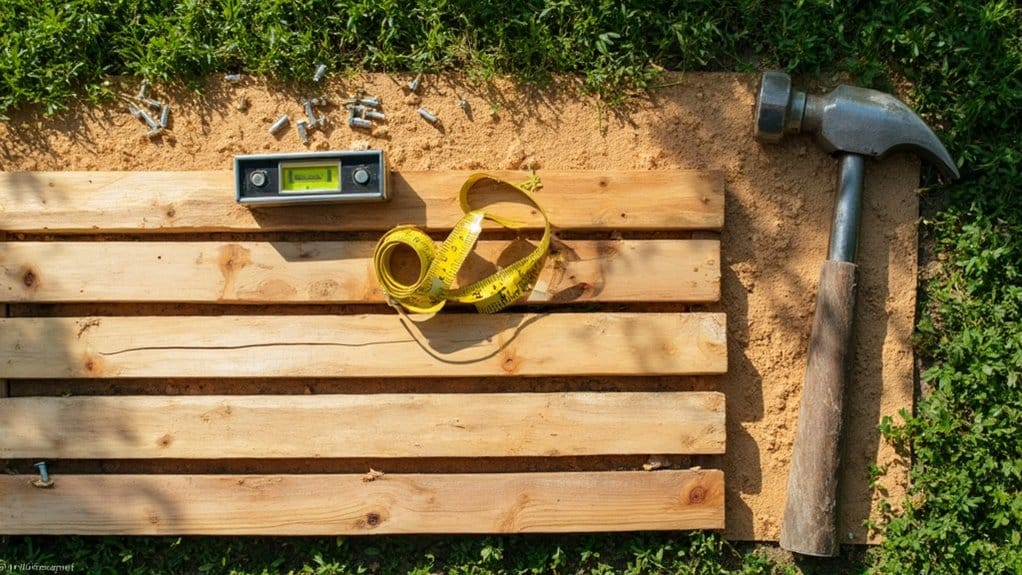When selecting pool fencing, prioritize durability and style. Iron fences provide a timeless look, while glass fences offer a modern touch and unobstructed views. Enhance safety with self-closing gates and designs that prevent climbing. Incorporate landscaping like hedges and flowers for added privacy and beauty. Also, check local regulations on fence heights and materials. With these tips, you can create a safe and stylish backyard oasis!
Key Takeaways
- Choose glass fencing for a sleek, modern look that keeps your views clear while ensuring safety.
- Consider aluminum panels for a stylish and durable option that matches contemporary homes and offers strong security.
- Install self-closing gates to boost safety, preventing unauthorized entry and meeting local safety codes.
- Opt for wood fencing for a natural vibe, but remember it needs regular upkeep to stay safe and attractive.
- Enhance privacy and beauty by adding plants or hedges around the pool fence for a more inviting atmosphere.
Choosing the Right Material for Your Pool Fence
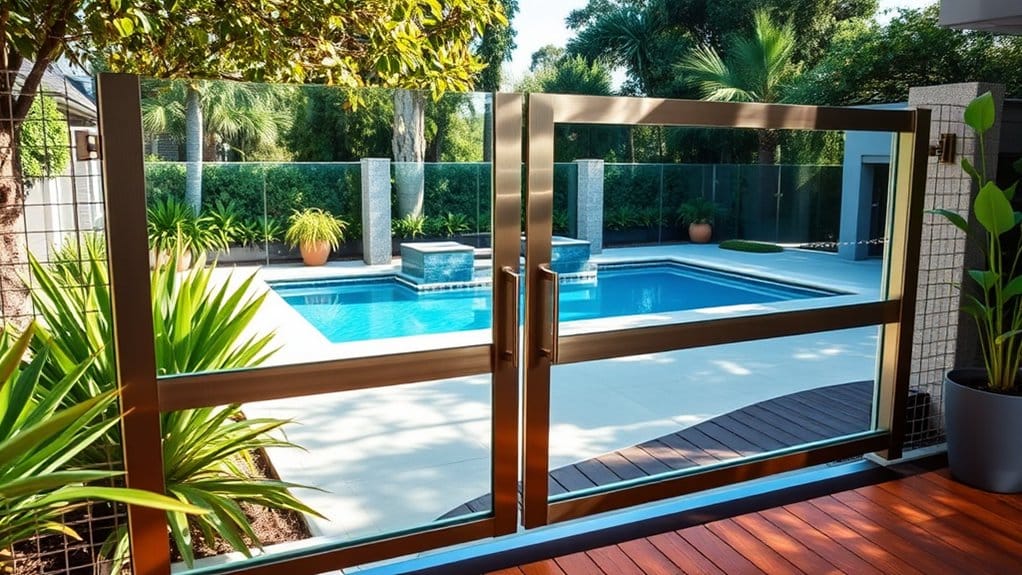
Choosing the right material for your pool fence is essential to meet your needs.
If you want durability and a classic look, iron fences are a great option. They’re strong and elegant but can be more expensive. Additionally, iron pool fences provide unobstructed views of the pool area, enhancing both safety and aesthetics. It’s important to ensure that any fence complies with Florida’s legal requirements for pool safety.
Wood provides a natural feel that enhances your pool area but requires regular maintenance to keep it looking good.
For unobstructed views, glass fences offer a modern aesthetic while ensuring safety.
If you’re looking for low maintenance, vinyl is resistant to pests and easy to care for, making it ideal for busy lifestyles.
Consider the pros and cons of each material to find the perfect fit for your outdoor space.
Enhancing Safety With Innovative Features
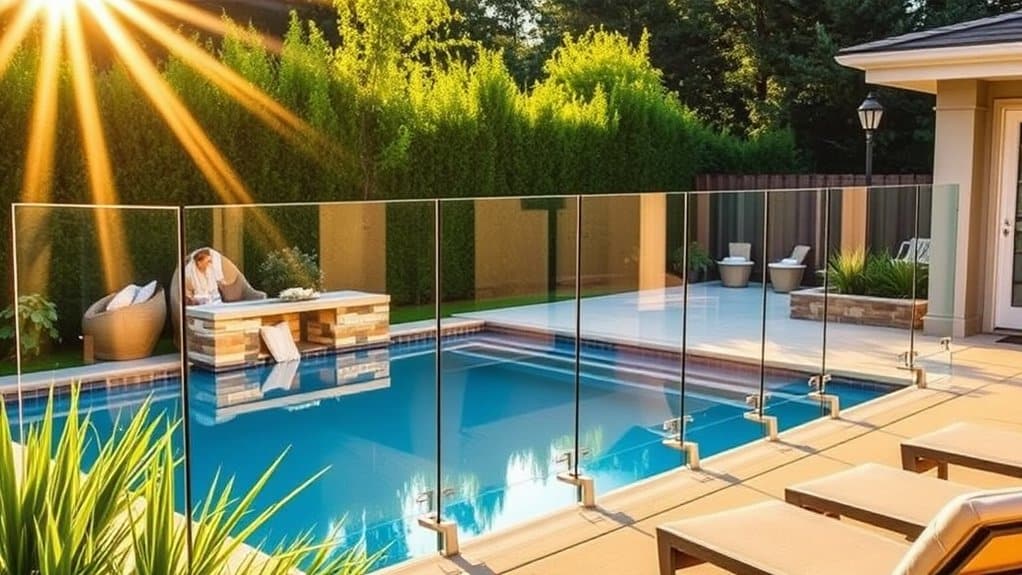
For pool safety, a basic fence isn’t enough. Consider a self-closing gate that shuts on its own, along with designs that prevent climbing. These features enhance safety and provide peace of mind for everyone around the pool. Additionally, incorporating pool fence regulations ensures compliance with local codes, further protecting your outdoor space. It’s also essential to ensure that the fence height is over four feet to deter climbing and provide an effective security barrier around the pool area.
Self-Closing Gate Mechanisms
Adding self-closing gate mechanisms to your pool area boosts safety and convenience. These gates automatically shut behind you, helping to keep kids and pets away from the pool. Here are some benefits:
- Safety: Stops unauthorized entry to the pool, which is crucial as approximately 1.5 million home invasions happen annually in the U.S.
- Convenience: No need to remember to close the gate.
- Customization: Available in various colors and styles to match your backyard.
- Durability: Built from sturdy materials like aluminum with powder-coated finishes, ensuring universal compatibility with any peg pole pool fence.
With self-closing gates, you ensure safety while enhancing the look and functionality of your outdoor space.
Non-Climbable Fence Designs
To improve safety around your pool, consider non-climbable fence designs that secure your space and enhance its look.
Glass fencing offers a modern, clear view while preventing climbing. Stainless steel and aluminum fences add style and blend into your landscape.
Vinyl options can mimic traditional materials without the climbing risks, and mesh fencing provides visibility and flexibility.
For wooden fences, use climb stop wedges or decorative posts for added safety. Ensure tight picket spacing and keep clear zones around your fence to create a secure and welcoming environment for family and friends. Additionally, choosing a low maintenance fence type can help ensure your pool area remains safe without the hassle of frequent upkeep.
Popular Pool Fence Styles and Trends
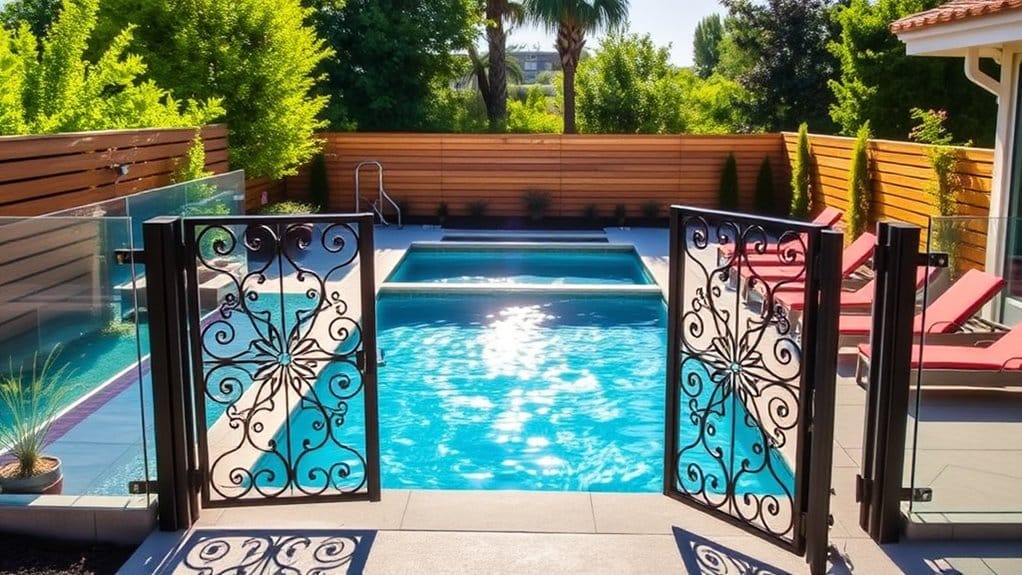
Here are four standout choices:
- Glass Fencing: Provides clear views while ensuring safety.
- Horizontal Slat Fencing: Offers a sleek, modern look with clean lines.
- Bamboo Fencing: Brings a tropical feel and privacy to your yard.
- Aluminum Panels: Durable and stylish, they fit well with contemporary homes.
Selecting the right pool fence can make your backyard a secure and attractive retreat. Additionally, be sure to consider local regulations to ensure your fence meets safety and aesthetic standards.
Understanding Legal Requirements for Pool Fencing
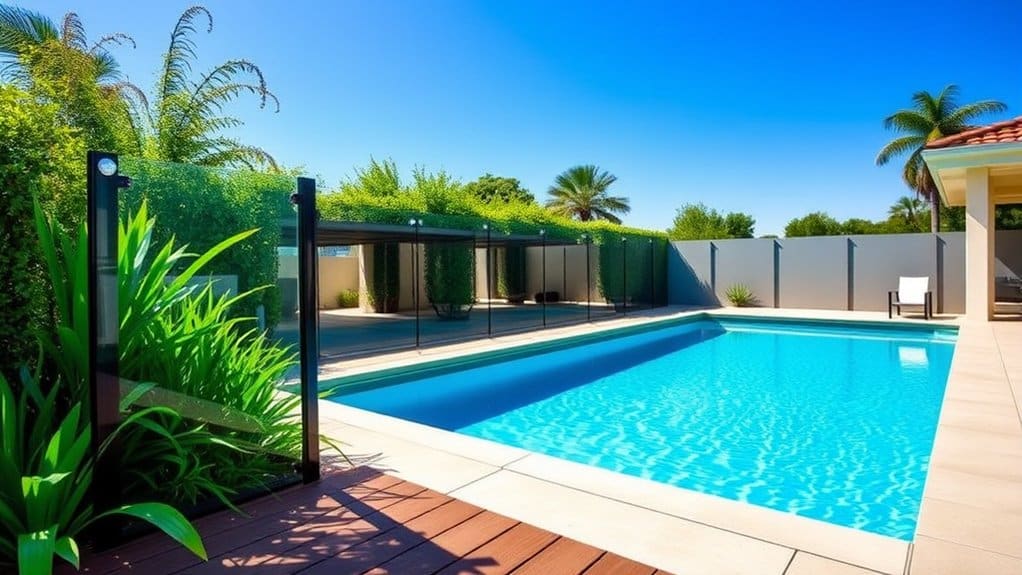
Understanding pool fencing laws is crucial, as they differ by location. Familiarize yourself with federal, state, and local regulations that specify things like fence height and gate requirements.
For example, most areas require fences to be 48 to 60 inches high for safety. Gates should self-close and latch securely out of reach of children.
Also, check local rules about fence placement and openings, as they can affect compliance. Regularly inspect and maintain your fence to avoid fines and ensure safety for everyone.
The Aesthetic Benefits of Pool Fencing
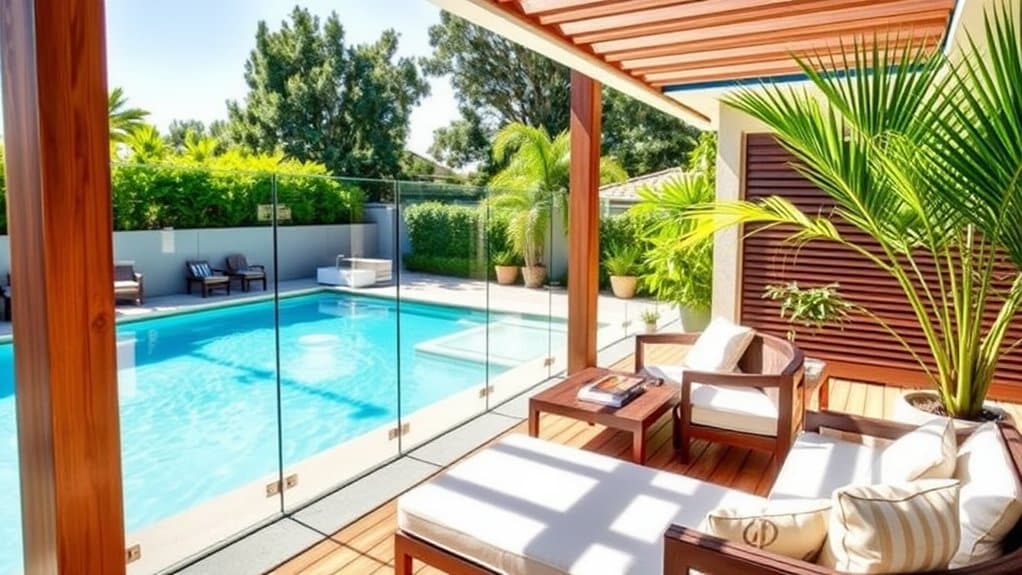
Enhancing your pool area with stylish fencing can elevate your backyard’s look.
Here are some aesthetic benefits of pool fencing:
- Material Options: Choose from glass, aluminum, wood, or mesh to match your style.
- Sleek Design: Modern fencing can seamlessly blend with your home’s architecture.
- Personalization: Add features like privacy panels or decorative planters for extra flair.
- Landscape Harmony: Fencing can enhance your landscaping, creating a cohesive overall appearance.
How Pool Fencing Reduces Liability and Increases Safety
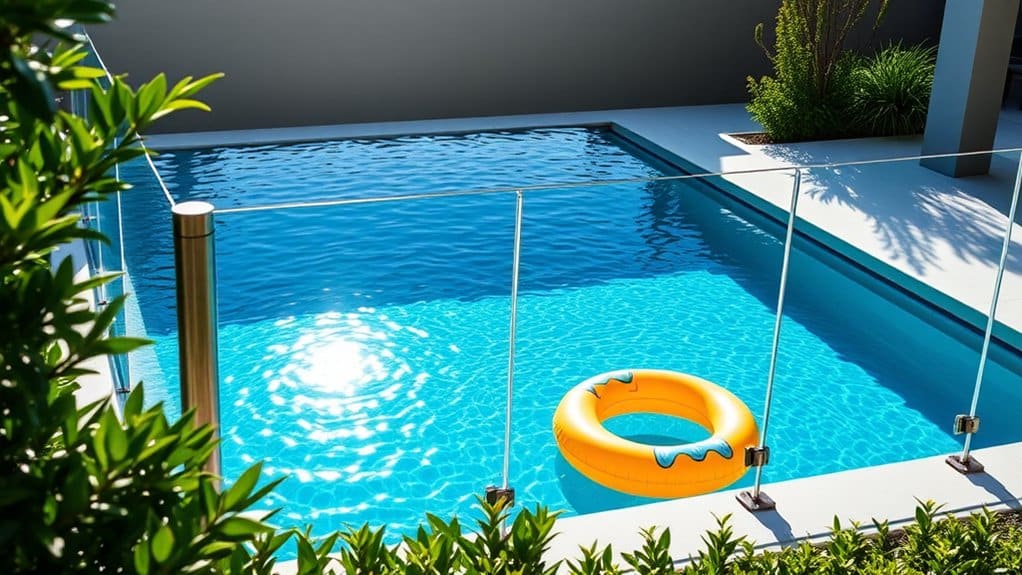
Installing pool fencing not only enhances your backyard’s look but also significantly improves safety and reduces liability risks.
A sturdy fence restricts unsupervised access, especially for children, which lowers the chances of drowning. Features like self-closing gates and secure latches are crucial for this safety.
Many insurance companies recognize these safety measures and may offer lower premiums as a result. Additionally, following safety regulations helps you meet legal obligations, protecting you from potential financial issues.
A well-fenced pool area creates a controlled environment, making supervision easier and allowing you to enjoy your pool with confidence.
The Importance of Proper Installation and Maintenance
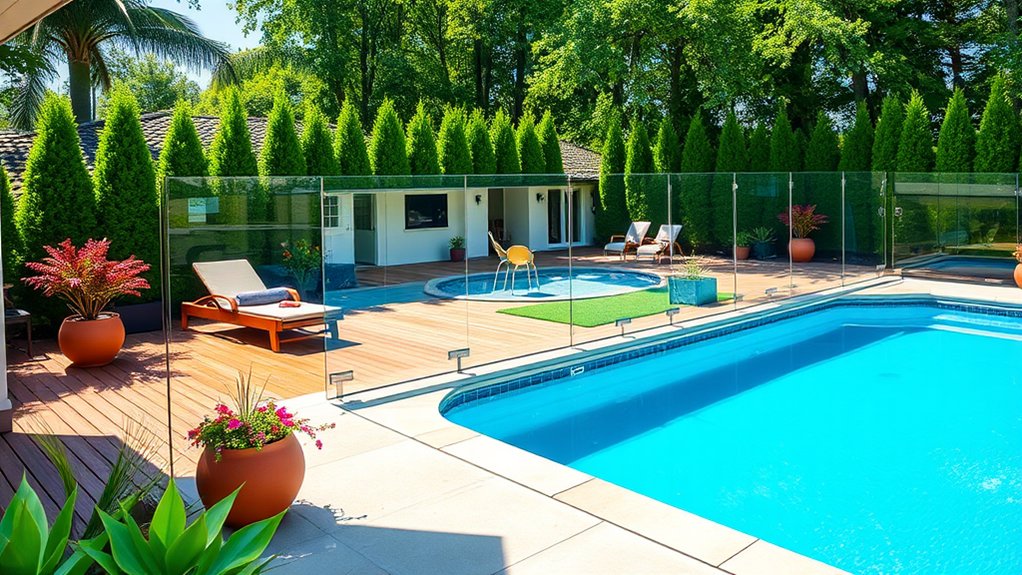
A well-installed pool fence is essential for safety. To ensure its longevity and effectiveness, pay attention to these key points:
- Plan Ahead: Measure accurately and check local building codes to avoid mistakes.
- Install Correctly: Use the right angles and concrete footings for stability, ensuring a level surface.
- Maintain Regularly: Check the tension and clean the fence to keep it safe and looking good.
- Check Safety Features: Make sure self-closing gates and alarms work properly to prevent unauthorized access.
Integrating Landscaping With Pool Fencing for a Cohesive Look
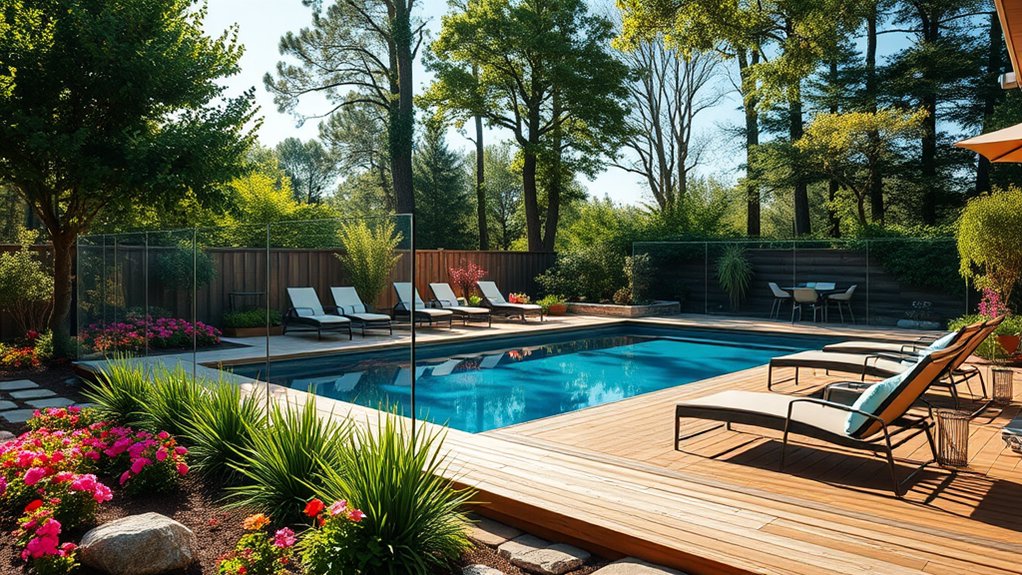
Integrating landscaping with your pool fencing not only boosts safety but also creates a relaxing outdoor environment.
For a unified look, consider materials like glass for clear views or wood that harmonizes with nature. Surround your pool with hedges or ornamental grasses to soften the edges and provide privacy.
Climbing vines on trellises can offer a lush backdrop, while colorful flowering plants bring vibrancy. Adding rock or water features can enhance depth and complement your fence.
Include benches or gazebos to create inviting spots. By focusing on landscape integration, you can achieve a stylish and safe pool area that reflects your personal style.
Frequently Asked Questions
What Is the Average Cost of Installing a Pool Fence?
Installing a pool fence generally ranges from $10 to $600 per linear foot, influenced by the materials and style you select. When planning, think about your budget, the look you want, and any local safety regulations.
How Often Should I Inspect My Pool Fence for Safety?
Regularly inspecting your pool fence is crucial for safety, much like checking your smoke detector. Aim to inspect it every three years, but do it more often if you notice wear. This helps ensure your pool area remains secure and meets safety standards.
Can I Install a Pool Fence Myself or Hire a Professional?
You can install a pool fence yourself to save money and customize it to your style. However, hiring a professional ensures expert installation and faster completion. Think about your skills and local regulations to choose the best option for you. For example, if you’re handy with tools, a DIY project might be fun. But if you’re unsure about safety codes, a pro could be the way to go.
What Are the Best Practices for Pool Fence Maintenance?
To maintain your pool fence effectively, clean it regularly, check for any damage, and lubricate moving parts. For wooden fences, look for rot or splinters; for metal, watch for rust; and for vinyl, check for cracks. These simple steps help ensure your fence remains safe and lasts longer.
How Does Weather Affect Different Pool Fencing Materials?
Weather significantly affects the durability of pool fencing materials. For example, moisture can cause wood to rot, metal to rust, and vinyl to weaken. UV rays can also fade surfaces. Selecting sturdy materials ensures your fence can handle the elements and stay looking good.
Conclusion
A well-chosen pool fence is essential for keeping your backyard safe and stylish. Think of it as a protective barrier that prevents accidents while enhancing the overall look of your space. With various designs and features available, you can find a fence that fits your style and keeps your pool area secure. This addition not only promotes safety but also creates a welcoming environment for family and friends to enjoy. Embrace the importance of a pool fence, and make your backyard a safe haven for fun and relaxation.

